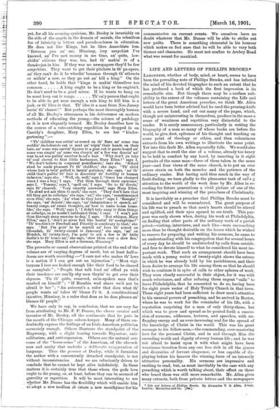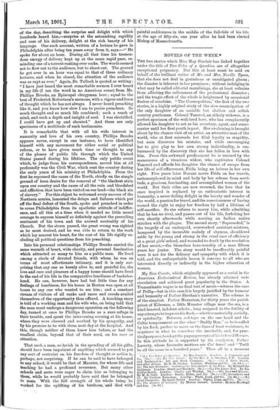LIFE AND LETTERS OF PHILLIPS BROOKS.*
LARGENESS, whether of body, mind, or heart, seems to have been the prevailing note of Phillips Brooks, and has infected the mind of his devoted biographer to such an extent that he has produced a book of which the first impression is its remarkable size. But though there may be a surface suit- ability in the extent of the volumes containing the Life and letters of the great American preacher, we think Mr. Allen would have been better advised had he used the pruning-knife with a severe hand, and cut out many of the pages, which, though not uninteresting in themselves, produce in the mass a sense of weariness and repetition very distasteful to the reader. It is surely unnecessary, particularly in writing the biography of a man so many of whose books are before the world, to give, first, epitomes of his thought and teaching on some point of theology or ethics, and then voluminous extracts from his own writings to illustrate the same point. Yet into this fault Mr. Allen repeatedly falls. We would also suggest that to swell the size of a volume, already too heavy to be held in comfort by any hand, by inserting in it eight portraits of the same man—three of them taken in the same year—and four views of the same church, is to put an over severe strain on both the muscles and the patience of the ordinary reader. But having said thus much in the way of fault-finding, we turn gladly to the pleasanter task of call 'g attention to the worth of the work done by Mr. Allen in re- cording for future generations a vivid picture of one of the most inspiring and winning of the preachers of Christianity.
It is inevitably as a preacher that Phillips Brooks must be considered and will be remembered. The great purpose of his life was to preach so that men's hearts should be stirred and uplifted, and their eyes opened to see truth. This pur- pose was early shown when, during his work at Philadelphia, on finding that other parts of the ordinary work of a parish priest—visiting, interviews, and such like—were encroaching more than he thought desirable on the hours which he wished to reserve for preparing and writing his sermons, he came to an understanding with his congregation that for several hours of every day he should be undisturbed by calls from outside, and free to devote himself to what he considered his most im- portant work. That such an arrangement should have been made with a young rector of twenty-eight shows the esteem in which he was already held by his parishioners, and their keen desire to arrange his life among them so that he should wish to continue it in spite of calls to other spheres of work, They were clearly successful in their object, for it was with much reluctance, and after refusing three urgent " calls " to leave Philadelphia, that he consented to do so, having been for eight years rector of Holy Trinity Church in that town. These eight years had been sufficient to draw men's attention to his unusual powers of preaching, and he arrived in Boston, where he was to work for the remainder of his life, with a reputation surprising for a man of only thirty-three, but which was to grow and spread as he poured forth a succes- sion of sermons, addresses, lectures, and speeches, with un- flagging energy and an-ever-increasing zeal for the spread of the knowledge of Christ in the world. This was his great message to his fellow-men,—the commanding, over-mastering love for the personal Christ, and in and through Him the exceeding worth and dignity of every human life ; and he was not- -*afraid to insist upon it with what might have., been wearisome iteration from any one less rich in all the graces and diversities of fervent eloquence, or less capable. of dis- playing before his hearers the winning force of an intensely attractive personality. His sermons are impressive and exciting to read, but, as must inevitably be the case with any preaching which is worth talking about, their effect on those who heard them was still more remarkable. Mr. Allen gives many extracts, both from private letters and the newspapers • WO and Lettem.of _Rhaliiit Brooks. By Alexander V. G. Allen. 2 :vols.
London : Macmillan and Co. [20s.) .
.of -the- -day, describing the surprise and delight with which hundreds heard himr7surprise at the astonishing rapidity and ease -cif his delivery, delight at the rich beauty of his language. One such account, written of a lecture he gave in Philadelphia after being ten years away from it says:—" He spoke for about an hour. During all that time his tremen- dous energy of delivery kept up at the same rapid pace, re- minding one of a torrent rushing over rocks. The words seemed not to flow out to the audience, but to shoot out. The ground he got over in an hour was equal to that of three ordinary lectures, and when he closed, the attention of the audience was as rapt as ever." Again, Dr. Tulloch is quoted as writing :
• " I have just heard the most remarkable sermon I ever heard in my life (I use the word in no American sense) from Mr. Phillips Brooks, an Episcopal clergyman here ; equal to the best of Frederick Robertson's sermons, with a vigour and force of thought which he has not always. I never heard preaching like it, and you know how slow I am to praise preachers. So much thought and so much life combined; such a reach of mind, and such a depth and insight of soul I was electrified. I could have got up and shouted." And these are only specimens of a multitude of such testimonies.
It is remarkable that with all his wide interest in numanity and love of his own country, Phillips Brooks appears never, except in one instance, to have identified himself with any movement for either social or political reform, or to have given much time or thought to any of the phases of public life through which the United States passed during his lifetime. The only public event which, to judge from his correspondence, moved him at all profoundly was the Civil War, which rent the country during the early years of his ministry at Philadelphia. From the first he espoused the cause of the North, chiefly on the simple ground of keen desire for the removal of "the blackest stain upon our country and the cause of all the ruin and bloodshed and affliction that have been visited on our land—the black sin of slavery." For this object he welcomed every success of the Northern armies, lamented the delays and failures which put off the final defeat of the South, spoke and preached in order to rouse Philadelphia from its apathetic attitude of indiffer- ence, and all this at a time when it needed no little moral courage to express himself so definitely against the prevailing sentiment of his town and the avowed neutrality of his Church. But the storm passed, the great wrong was righted as he most desired, and he was able to return to the work which lay nearest his heart, for the rest of his life rigidly ex- cluding all political questions from his preaching.
Into his personal relationships Phillips Brooks carried the same warmth of heart, wide charity, and personal fascination Which attracted so many to him as a public man. He lived among a circle of devoted friends, with whom he was on terms of most affectionate intimacy, and it is only sur- prising that any one so keenly alive to, and grateful for, the love and care and pleasure of a happy home should have lived to the end of his life in the comparative loneliness of bachelor- hood. He can, however, have had but little time for any feelings of loneliness, for his house in Boston was open at all hours to any one who wanted to see him; and a constant stream of visitors of all ranks and races and creeds availed themselves of the opportunity thus offered. A touching story is told of a working man and his wife who, on being told that the man must undergo a dangerous operation on the following day, turned at once to Phillips Brooks as a sure refuge in their trouble, and spent the intervening evening at his house, where they were cheered and soothed by his sympathy, and by his promise to be with them next day at the hospital. And this, though neither of them knew him before, or had the smallest claim, beyond that of their need, on his care or attention.
That such a man, so lavish in the spending of all his gifts, should have been impatient of anything which seemed to put any sort of restraint on his freedom of thought or action is, perhaps, not surprising. If he can be said to have belonged to any school, it would be that of Maurice, for whose life and teaching he had a profound reverence. But many other schools and sects were eager to claim him as belonging to theni, while he would probably have said that he belonged tO ricaie. With the full strength of his whole being he worked- for the uplifting of his brethren, 'aid died with
painful suddenness in the middle of the full-tide of his life, at the age of fifty-six, one year after he had been elected Bishop of Massachusetts.







































 Previous page
Previous page